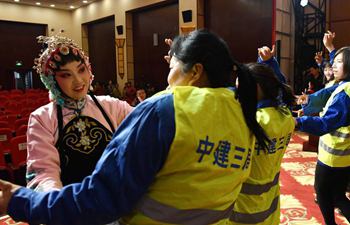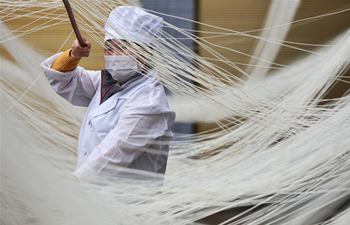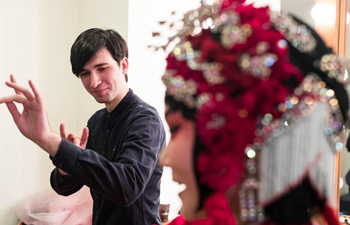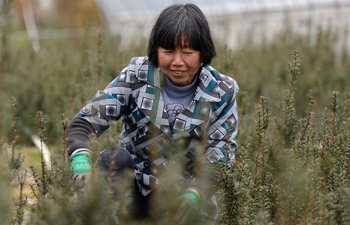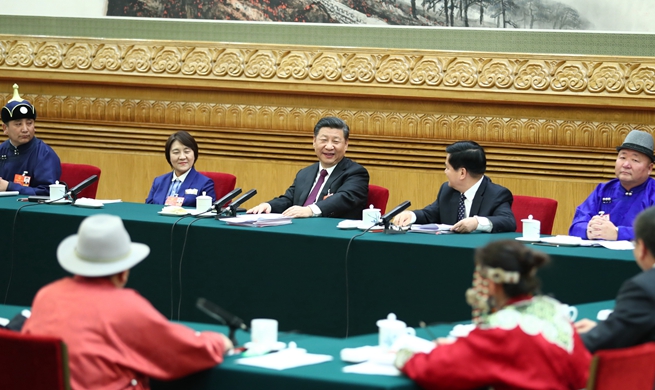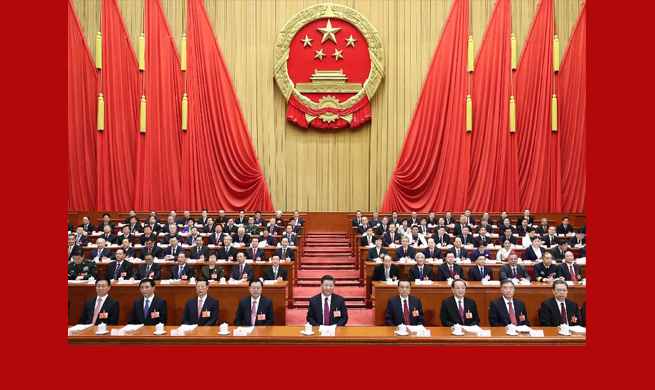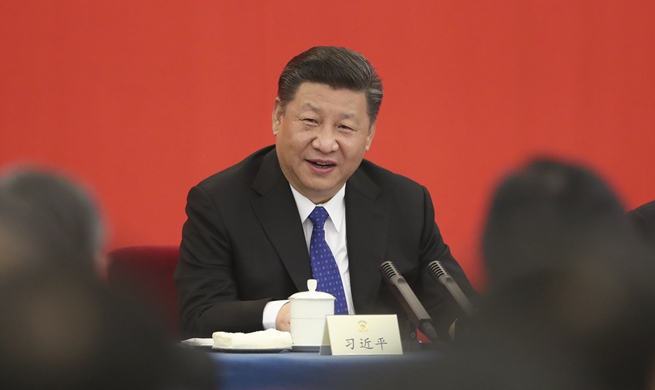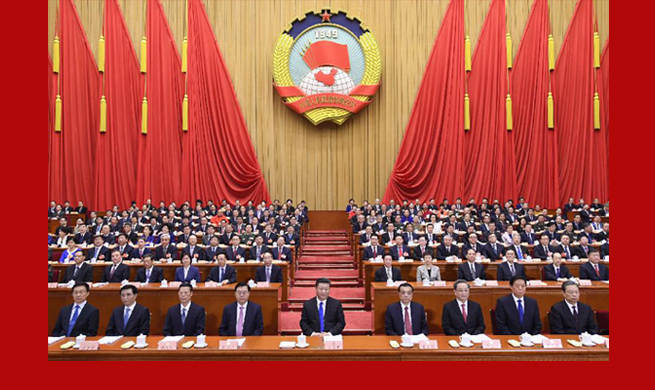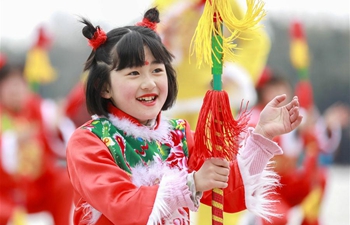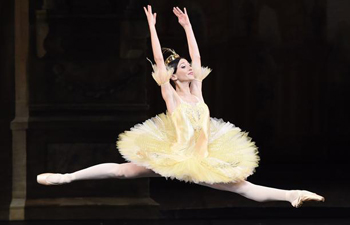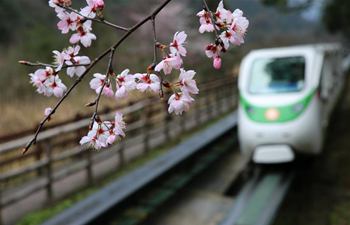by Xinhua writer Tamara Treichel
BEIJING, March 6 (Xinhua) -- At first glance, little appears to set Rick O'Shea apart from the other typical Sanlitun "laowai" (foreigners) -- he likes to wear hoodies, drink Starbucks and rollerblade in Chaoyang Park.
Yet O'Shea has lived in China for about three decades and looks back at a successful career as a radio host on China Radio International's Joy FM program in Beijing from 1996 to 2007. It was O'Shea who created the program's slogan "Ni hao are you?" that still excites former fans.
O'Shea first came to Beijing to co-host the Joy FM program and had done radio and TV broadcasting in Hong Kong for many years before moving to Shanghai and Beijing.
"I'm amazed that millions in China still remember it, even though that kind of radio is on the decline. It was a special relationship for a generation," O'Shea told Xinhua in an interview.
RELATIONSHIP WITH SAN MAO
Next to his radio career, O'Shea is known to have had a special relationship with the Chinese travel writer and novelist San Mao. O'Shea said they enjoyed a friendship-turned-romance before San Mao's tragic death in 1991.
"She wrote that she was going to marry me at the time of her death. It's the San Mao story many do not know and I feel she left me this story to tell," O'Shea said.
He recently was interviewed in a Spanish documentary project about San Mao and has now found an agent to help him get an expanded version of his story out, first in writing, then as a movie. He had previously devoted a chapter to his relationship with the writer in his book "Radio Chopstix: An American DJ in China."
"Her English name was Echo," he told Xinhua," and many think of her on March 26, her birthday. Her legacy seems to echo through the years."
EMBRACING CHINA
During his many years in China, O'Shea has learned to embrace his adopted country. Now he wants to help others know China with his current creative project.
O'Shea describes himself as a "conceptual artist." His Sanlitun apartment, which he calls a "home and creative zone," has an international flair and features photos he took of singers Teresa Teng, Anita Mui and Eric Clapton, as well as small items not only from China, but from all over the world. You can see souvenirs from Africa, Mauritius, Bali and Thailand as well as a Superman mug on the bookshelves, and a wall clock with the Batman logo.
Underneath the clock is a collection of mugs, temporary tattoos, earrings and a pendant all featuring a female image that resembles the number 8. It has a smile like that of the Mona Lisa. "Babei" was designed by O'Shea together with Yang Lan, a Chinese woman. O'Shea said that many Chinese believe that the number 8 is lucky.
"China deserves to have a special Chinese image that can be promoted and seen around China and the world. Babei is beautiful and carries good luck. It is unique, designed by Chinese and reaches all ages," O'Shea said.
He plans to follow a brand-licensing concept for Babei and have it put on products such as baby blankets, tote bags and T-shirts, cups and numerous other items. He is confident Babei will be universally appealing because "all people in the world can use and embrace a good luck symbol from China. It's as simple as that."
When asked how it differs from Japan's Hello Kitty or Paul Frank's monkey from the United States, O'Shea said Babei is an image "made in China." What's more, "it does not represent a product such as Starbucks or Apple. It adds value to any product it's on. It's not really a logo. It's an image of good luck that can be passed around by being on anything," O'Shea said.
The American also said that it would be a prime example that today's Chinese are innovative and have created something positive from China that people around the world can embrace and share.
STRUGGLING ARTIST
O'Shea has been struggling to promote Babei, but he is confident that there is room in this world for more than Hello Kitty. "My vision is that it can become as popular as Hello Kitty. World-wide. And let Chinese be proud of Babei's mission to bring something good to the world," he said.
A tote bag with the Babei image hangs from a hook on his living room wall, a symbol of his dedication to his mission.
"My background is not business. I can create things that people love. I have been looking for but I have not found a business partner yet to support this project. Finding people smart enough with resources, finances and connections would be perfect," O'Shea said.
"Truthfully, it has been difficult to find the right people. But I persist in my purpose of finding a great partner to help make this happen. I see so many insignificant images everywhere and people have become walking billboards, I think I can make the world look a little better with an image from China," he said.
O'Shea even had the chutzpah to send an email to Alibaba founder Jack Ma recently, requesting a face-to-face meeting. He thinks his goal would align with Ma's "sustainable money" concept as the Alibaba founder also combines doing business with benefiting society and promoting a positive image of his mother country, China.
O'Shea is hoping to connect with Ma or someone like him who wants to join his marketing mission and help build a "Chinese Hello Kitty" for all ages. While he is searching for the right partner for his project, O'Shea is enjoying working on Babei, connecting with people from various walks of life and involving them in his project.
O'Shea encourages individuals to download Babei phone wallpapers for free and people can also send in their self-made digital wallpapers, which he posts on his Babei website, showing the growing popularity of Babei.
The collage-like website has become a platform for participation and sharing. Similarly, when he was working for Joy FM as a radio host, he asked the audience to send in pictures of themselves and posted them on the studio "Great Joy Wall." They became a visual part of the "Joy Family."
"I love projects where people become involved. Let them become a part of the creation," O'Shea said.
"Sharing is a part of Chinese culture. Encouraging people to share a part of China is what it is all about," O'Shea said about Babei.
While the heyday of traditional radio is over, O'Shea has returned to his talent of visual creations. He has adapted to the digital age and uses it to promote his good luck image from China. However, he thinks the human element should not be forgotten.
"My projects, like Babei, start with and stay with a true concept. Let it expand from there with the support of the consumer. Joy FM was the same. Create a family feeling. The world today has become digital and detached. People want to be touched!" he said.
(Xinhua reporter Liu Bowei contributed to the story.)





